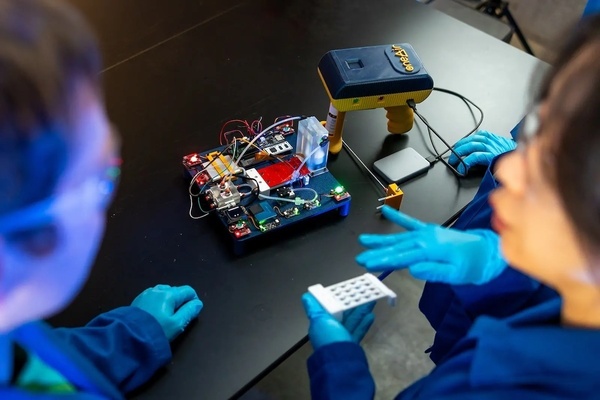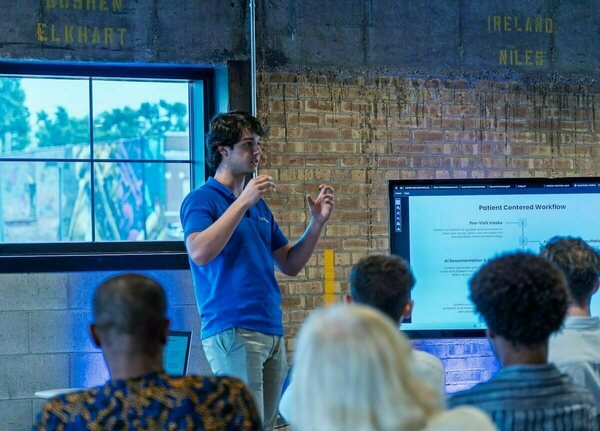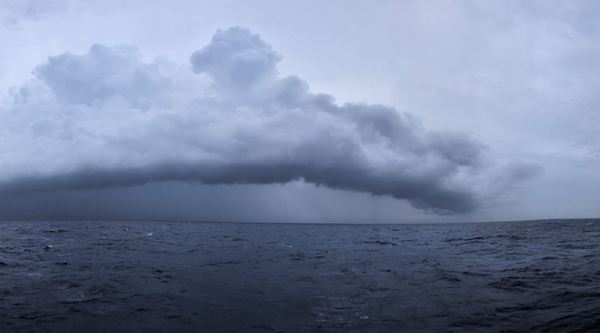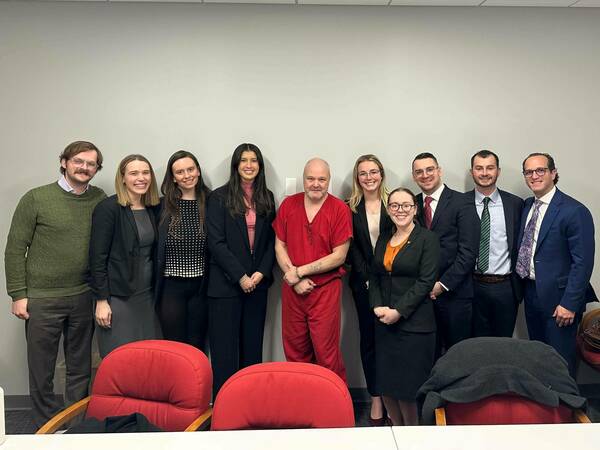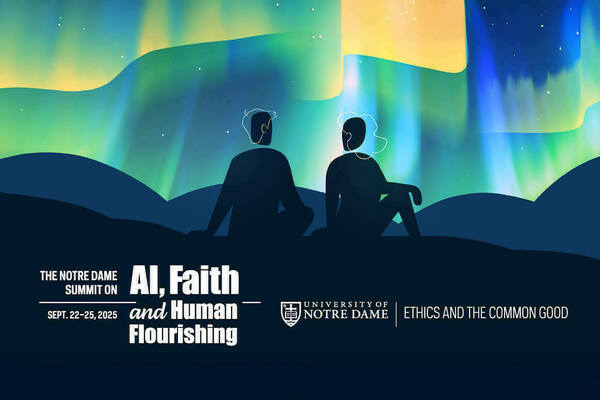Physicist Laura Fields granted a Presidential Early Career Award
Laura Fields, associate professor in the Department of Physics & Astronomy at the University of Notre Dame, received the Presidential Early Career Award for Scientists and Engineers (PECASE) for her research studying the properties of fundamental particles called neutrinos.
Fields was among the nearly 400 researchers who were named awardees by President Joe Biden on January 14. PECASE is the highest honor bestowed by the U.S. government for scientists and engineers early in their careers.
Neutrinos are produced in many places in the universe, and the ones Fields studies are created using particle accelerators. Her research grant from the DOE in 2020, while she was a staff scientist at Fermi National Accelerator Laboratory (Fermilab), funded several measurements that will help scientists better understand neutrino beams. She has continued that work at Notre Dame since 2021.
“We currently have a surprisingly poor understanding of the number of neutrinos created in accelerator-based neutrino beams,” she said, adding that her reaction to the recent honor is one of gratitude.
“The research I proposed was not the most glamorous work; it will not directly answer any of the big outstanding questions about how our universe works,” she said. “But it will help turn our accelerator-based neutrino beams into the precise tools we need to answer some of those questions.
“So I'm glad this type of work is being recognized and hope it encourages more people to work on this important (and fun!) topic.”
Fields earned her bachelor’s degree in physics and math from the University of Arkansas, a certificate of advanced study in mathematics from the University of Cambridge, and her master’s and doctorate degrees in physics from Cornell University. She was an associate scientist at Fermilab before being named an associate professor at Notre Dame.
“We were lucky to recruit Dr. Fields to join our department,” said Morten Eskildsen, chair of the Department of Physics & Astronomy. “Laura has, in a short amount of time, been able to revitalize our research in the field of neutrino physics, and I am pleased that she is being recognized with the PECASE.”
Established by President Bill Clinton in 1996, PECASE recognizes scientists and engineers who show exceptional potential for leadership early in their research careers. The award recognizes innovative and far-reaching developments in science and technology, and expands awareness of careers in science and engineering. This year’s awardees are employed or funded by 14 participating agencies within the Departments of Agriculture, Commerce, Defense, Education, Energy, Health and Human Services, Interior, Transportation, Veterans Affairs, and the Environmental Protection Agency, the intelligence community, the National Aeronautics and Space Administration, the National Science Foundation, and the Smithsonian Institution.
While grateful for the recognition, Fields said that none of her research would be possible without the support of her department, students, and postdoctoral fellows. She said she appreciates the support of many collaborators on projects including the Deep Underground Neutrino Experiment (DUNE), the Experiment to Measure the Production of Hadrons At a Testbeam In Chicagoland (EMPHATIC), and SPS Heavy Ion and Neutrino Experiment (NA61/SHINE).
Originally published by at science.nd.edu on January 17, 2025.
Latest Research
- Fighting for Better Virus DetectionAn electronic nose developed by Notre Dame researchers is helping sniff out bird flu biomarkers for faster detection and fewer sick birds. Read the story
- Notre Dame’s seventh edition of Race to Revenue culminates in Demo Day, a celebration of student and alumni entrepreneurship…
- Managing director brings interdisciplinary background to Bioengineering & Life Sciences InitiativeThis story is part of a series of features highlighting the managing directors of the University's strategic initiatives. The managing directors are key (senior) staff members who work directly with the…
- Monsoon mechanics: civil engineers look for answers in the Bay of BengalOff the southwestern coast of India, a pool of unusually warm water forms, reaching 100 feet below the surface. Soon after, the air above begins to churn, triggering the summer monsoon season with its life-giving yet sometimes catastrophic rains. To better understand the link between the formation of the warm pool and the monsoon’s onset, five members of the University of Notre Dame’s Environmental Fluid Mechanics Laboratory set sail into the Bay of Bengal aboard the Thomas G. Thompson, a 274-foot vessel for oceanographic research.
- Exoneration Justice Clinic Victory: Jason Hubbell’s 1999 Murder Conviction Is VacatedThis past Friday, September 12, Bartholomew County Circuit Court Judge Kelly S. Benjamin entered an order vacating Exoneration Justice Clinic (EJC) client Jason Hubbell’s 1999 convictions for murder and criminal confinement based on the State of Indiana’s withholding of material exculpatory evidence implicating another man in the murder.
- Notre Dame to host summit on AI, faith and human flourishing, introducing new DELTA frameworkThe Institute for Ethics and the Common Good and the Notre Dame Ethics Initiative will host the Notre Dame Summit on AI, Faith and Human Flourishing on the University’s campus from Monday, Sept. 22 through Thursday, Sept. 25. This event will draw together a dynamic, ecumenical group of educators, faith leaders, technologists, journalists, policymakers and young people who believe in the enduring relevance of Christian ethical thought in a world of powerful AI.








